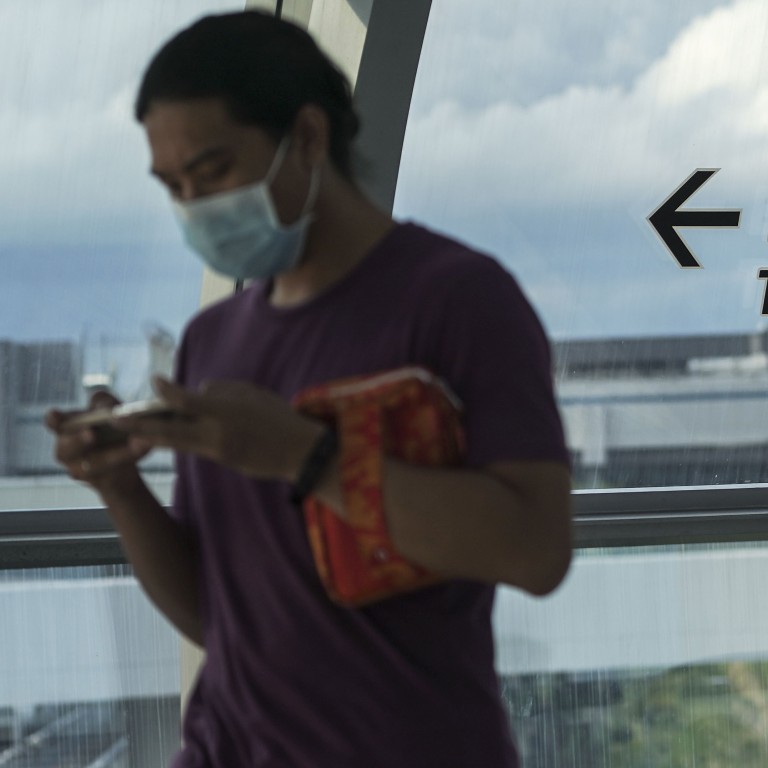
Singapore-Hong Kong travel bubble likely to be delayed beyond May 26 after spike in Covid-19 cases, minister says
- Singapore has already recorded 112 domestic infections this month, compared with 55 cases in April and just nine in March
- Hong Kong confirms one imported Covid-19 case on Friday, marking a seventh straight day without a local, untraceable infection
Hong Kong’s long-awaited travel bubble with Singapore is most likely to be postponed for a second time, with a top official warning of a “high chance” that the quarantine-free scheme will not be launched on May 26 as the city state battles a surge in coronavirus cases.
Edward Yau Tang-wah, Hong Kong’s secretary for commerce and economic development, on Friday said he had been in touch with his Singaporean counterpart for updates on the country’s Covid-19 situation.
Yau said he would talk to Singapore’s minister for transport, S. Iswaran, early next week for a final decision on whether to go ahead.
“The [outgoing] Singaporean minister told me that there might be a high chance the bubble arrangement may not be able to resume under the agreed mechanism on May 26,” he said, citing the need for “absolute precautions”.
Hong Kong makes hotel quarantine mandatory for Taiwan arrivals amid recent outbreak
On the Singaporean side, outgoing transport minister Ong Ye Kung noted that Hong Kong had become a safe destination in terms of the infection situation.
“[But] given the rising cases in Singapore it is very likely that Singapore will not be able to meet the resumption criteria,” he said.
On April 26, the two governments came together to announce the May 26 launch after the first attempt to launch their travel bubble on November 22 last year was suspended at the last minute because of an outbreak in Hong Kong.
Asked if another travel bubble delay would have an impact on efforts to revive tourism, one of the city’s pillar industries, Hong Kong government economist Andrew Au Sik-hung said the recovery would be “very slow”.
Hong Kong confirmed one imported Covid-19 case on Friday, marking a seventh straight day without a local, untraceable infection.
In contrast, Singapore reported 24 new local cases on Thursday, the highest single-day tally since July last year, and another 24 infections on Friday.
Singapore now has 12 active clusters, with 136 domestic infections reported this month, compared with 55 in April and just nine in March.
The latest surge has spread to Changi airport, where a cluster of 59 infections has prompted authorities to restrict public access to the terminal for a fortnight until May 27.
The city state on Friday also tightened social-distancing rules for four weeks until June 13.
Singaporean authorities have detected several coronavirus variants of concern in both local and imported infections, such as the B.1.617 strain that was first identified in India and which is thought to be more transmissible.
What’s the difference between coronavirus ‘variants’ and ‘mutants’?
The two airlines designated to operate flights for the travel bubble – Cathay Pacific Airways and Singapore Airlines – said they were closely monitoring developments.
Cathay said it would tell customers as soon as possible in the event of any changes to flight schedules in question, while Singapore Airlines said it would defer to its regulators on the travel bubble.
Yuen Chun-ning, CEO of Hong Kong-based travel agency WWPKG, said the business impact would be limited even if there was a delay, because only about 50 customers had bought hotel or tour packages or flight tickets with the company so far.
“But for the recovery of the tourism industry, it will mark a setback,” Yuen said.
Singapore was initially not a hot travel destination for Hongkongers and the requirement for them to be vaccinated before travelling had further dampened demand, he said.
Yiu Si-wing, the lawmaker for Hong Kong’s tourism sector, expressed disappointment over the travel bubble news, but acknowledged that public health remained the foremost consideration.
“From the perspective of public health precautions, there is an inevitable need to put safety first,” he said. “Infections in Singapore have worsened, and Hong Kong has to be cautious as well to avoid a fifth-wave outbreak.”
Under the plan announced in April, travellers in either direction would have to take coronavirus tests before boarding and after landing, though only Hong Kong would require its residents to be fully vaccinated to take part.
Those below 16 years of age, under medical advice against inoculation, or using travel documents other than a Hong Kong passport for departure would be exempted from the vaccination rule.
One designated flight carrying 200 passengers would initially be allowed from each side daily, though that would jump to two flights per day on June 10 if the infection situation remained stable. No transit passengers would be allowed.
The scheme would be suspended for two weeks if the seven-day moving average of unlinked Covid-19 cases in either city was greater than five.
As of Friday, the figure for Hong Kong stood at 0, and at 2.29 for Singapore.




